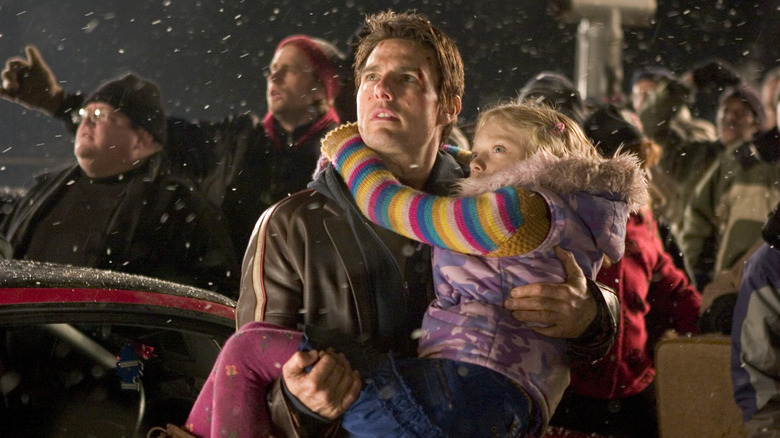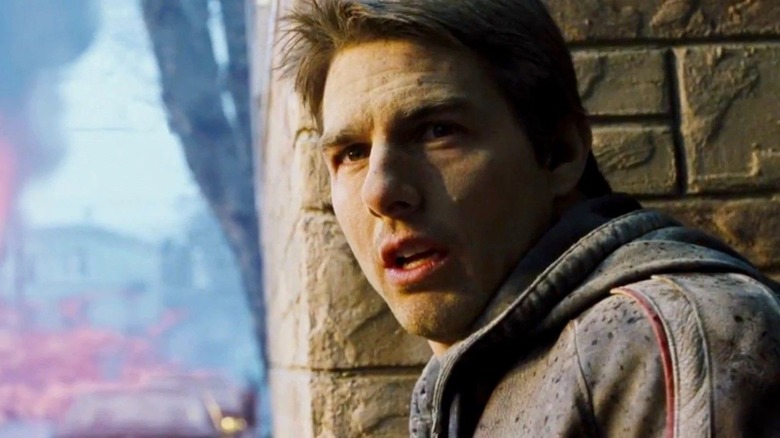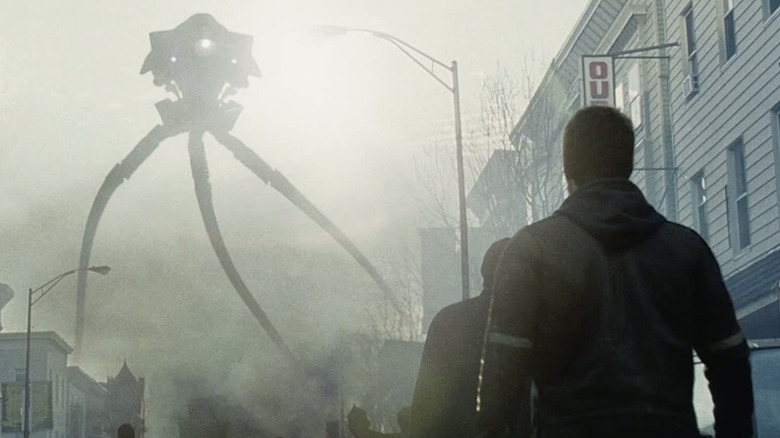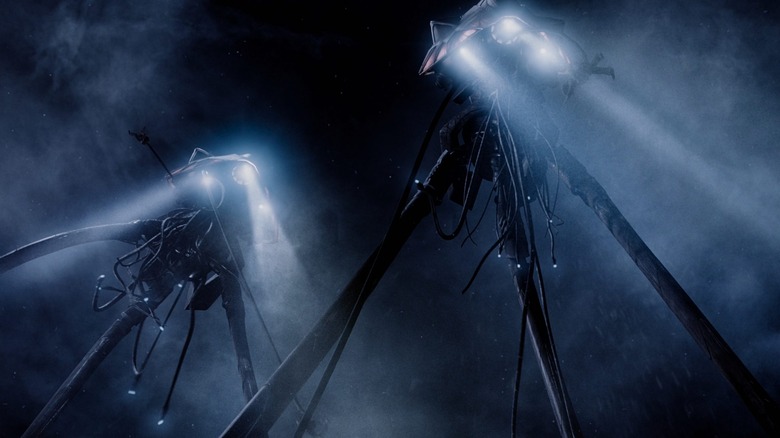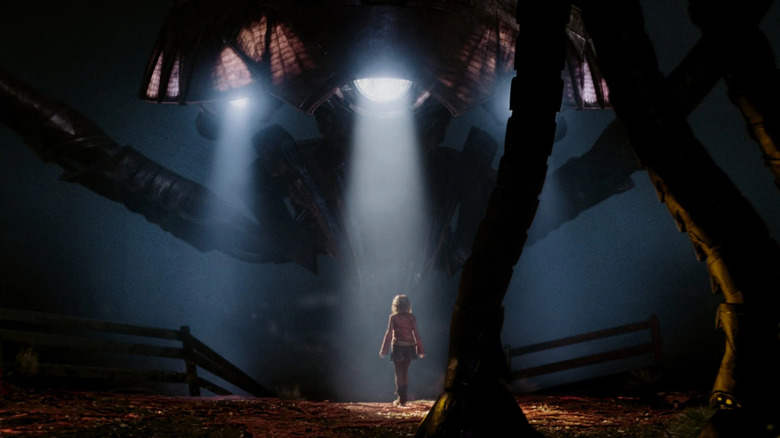The Daily Stream: Steven Spielberg's War Of The Worlds Remains A Complex, Atypical Blockbuster
(Welcome to The Daily Stream, an ongoing series in which the /Film team shares what they've been watching, why it's worth checking out, and where you can stream it.)
The Movie: "War of the Worlds" (2005)
Where You Can Stream It: Netflix
The Pitch: Steven Spielberg's aliens have historically been friendly. E.T. and the little grey dudes from "Close Encounters of the Third Kind" were sometimes sad and mysterious, but always family-friendly. Not so much the aliens in "War of the Worlds." This film is not the typical blockbuster awe and spectacle God's eye view that dominated alien invasion movies throughout the '90s and early aughts. Spielberg is working through post-9/11 darkness, channeling the imagery that traumatized a nation, and telling this invasion story from a ground's eye viewpoint.
Why it's essential viewing
As a giant Spielberg nerd (who isn't, really?), I find the post-"Saving Private Ryan" era of the filmmaker's output to be extremely fascinating. Starting with 2001's "A.I.: Artificial Intelligence" and going through to "Indiana Jones and the Kingdom of the Crystal Skull," we're looking at seven feature films made in a seven-year period that range from Spielberg at his best to Spielberg at his worst, but all of them have something to say.
We can debate about his more controversial movies in this period, like "The Terminal" or "A.I.," but that's a discussion for another day because the movie I want to hone in on is one that hit smack dab in the middle of this very prolific time in Spielberg's career: 2005's "War of the Worlds."
Currently available on Netflix, "War of the Worlds" was a movie that polarized audiences upon release. The predominant opinion back then (trust me, youngins, I was there) was that it was pretty cool and dark, but had a cop-out happy ending. That echoed a lot of the criticisms of "A.I.," actually. All the seasoned cinephiles and critics were in on the darkness but really didn't buy the abrupt happy ending.
In my memory, there was a slight dismissiveness towards this movie. Not by everybody, but I do recall a lot of folks wrote off the darkness of this film as too much while at the same time knocking the happy ending. With some distance, I think time has been very kind to it, especially in regards to just how much of it is designed to confront our national horror.
Using 9/11 imagery to ground the fantastic
Made just a few years after 9/11, Spielberg made the very provocative choice to tackle that head-on. One of the first shots of the movie is a sweeping helicopter shot that shows the newly changed Manhattan skyline feeling naked without the iconic twin towers. Right up front, this movie is framing the coming alien invasion alongside the still very fresh pain of the attack on New York City.
This is important because everything Spielberg wants to do with this story is the antithesis of the typical alien invasion blockbuster. This one's going to hurt, even if the movie star to end all movie stars, Mr. Tom Cruise, is in the lead.
Cruise's Ray Ferrier is a screw-up. He destroyed his marriage, he alienated both of his kids, and he's going nowhere at his blue-collar job. This is the guy Spielberg decided to tell this story through. All the action in the movie is told from the point of view of someone on the ground, which personalizes the horror. There's absolutely time for awe, especially when the first tripod rises up out of the ground, but when the invasion begins in earnest, this ground's eye vantage point quickly takes on an eerily familiar feel. The chaos and frantic camera movement mirror the news and cell phone footage we all obsessively watched on our TVs after the World Trade Center was hit.
This could have come off as ghoulish, but I think it works for this tale, which is ultimately about a family banding together to get through a horrific attack and making it through to the other side. Humanity isn't unscathed, and neither are Ray and his kids, but they did survive. You get the feeling that a rebuilding of some sort is going to happen.
More Saving Private Ryan than Raiders of the Lost Ark
In the lead-up to this film's release, we had the original H.G. Wells novel and the cheesy (but highly influential) George Pal adaptation of the early '50s to go on. The assumption was that this was going to be helmed by action-adventure Steven Spielberg, but the guy who showed up was more like the director of "Saving Private Ryan" than "Raiders of the Lost Ark."
The opening to "Saving Private Ryan" has a lot in common with the tone of this whole movie. The filmmaking is masterful in both instances, but fun isn't exactly the word I'd associate with either. I think that threw some folks for a loop and for good or ill, today's audiences are much more willing to tackle trauma in their storytelling.
I guess it's still possible that new audiences won't buy the happy ending, either. But that comes baked into the very identity of "War of the Worlds" as a story, so deal with it. And, if you're going to put an audience through two hours of terror, you've got to give your poor characters a win at the end.
A hopeful ending makes the bleak journey worthwhile
If the whole point of this movie is to give audiences a safe way to examine the feelings of helplessness and fear that came after the 9/11 attacks, then you have to show the light at the end of the tunnel. It might be edgelord porn to wallow in a crazy dark ending, and Lord knows I love my fair share of bleak endings, but you can't evoke the imagery of 9/11, put your audience through that, and not tell us everything is going to be okay at the end.
So, while "War of the Worlds" might not be as rewatchable as, say, "Raiders of the Lost Ark" or "Jaws," it is proving to be one of Spielberg's most fascinating blockbusters. It has all the spectacle you'd expect from a Spielberg film, only it's told in an intriguing, confrontational way that we're just not used to getting from our big-budget, popcorn entertainment.
